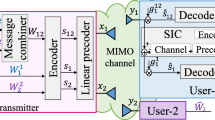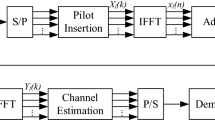Abstract
Since, in a practical system perfect channel state information (CSI) is not possible due to presence of noise. This paper deals with the performance of space-time trellis code (STTC) in multi-carrier code-division multiple-access systems in presence of channel estimation (CE) error and results are compared with perfect CSI at the receiver. The pilot symbol assisted (PSA) technique is used for CE employing minimum mean-square error method. The symbol error rate (SER) performance is observed by employing Viterbi decoding algorithm to decode STTC code at the receiver in multi-path fading channel. The simulated SER performances in presence of CE error and with perfect CSI are compared with the theoretical performances to validate the theoretical analysis.





Similar content being viewed by others
References
Chang, C. L., Huang, P. S., & Te-Ming, Tu. (2006). An integrated analysis for MC-CDMA system with synchronization errors over fading channels. Journal of the Chinese Institute of Engineers, 29(7), 1185–1193.
Juntti, M., Vehkapera, M., et al. (2005). MIMO MC-CDMA communications for future cellular systems. IEEE Communication Magazine, 43(2), 118–124.
Hijazi, S., Natarajan, B., & Wu, Z. (April 2004). Flexible spectrum use and better coexistence at the physical layer of future wireless systems via a multicarrier platform. IEEE Wireless Communications, pp. 64–71.
Sourour, E. A., & Nakagawa, M. (1996). Performance of orthogonal multicarrier CDMA in a multipath fading channel. IEEE Transactions on Communications, 44(3), 356–366.
Hara, S., & Prasad, R. (1997). Overview of multicarrier CDMA. IEEE Communication Magazine, 35(12), 126–133.
Nago, T. M. H., Zaharia, G., Bougeard, S., & Helard, J. F. (2007). 4-PSK balanced STTC with two transmit antennas. In Proceedings IEEE VTC’07, pp. 1693–1697.
Naguib, A. F., Tarokh, V., Seshadri, N., & Calderbank, A. R. (1998). A space-time coding modem for high data-rate wireless communications. IEEE Journal on Selected Areas in Communications, 16(8), 1459–1478.
Miller, S. L., & Rainbolt, B. J. (2000). MMSE detection of multicarrier CDMA. IEEE Journal on Selected Areas in Communications, 18(11), 2356–2362.
Aktas, E. (2012). Iterative message passing for pilot-assisted multiuser detection in MC-CDMA systems. IEEE Transactions on Communications, 60(11), 3353–3364.
Zheng, D., Xuegui, S., Cheng, J., & Beaulieu, N. C. (2011). Maximum likelihood based channel estimation for macrocellular OFDM uplinks in dispersive time-varying channels. IEEE Transactions on Wireless Communications, 10(1), 176–187.
Wong, K. K., Murch, R. D., & Letaief, K. B. (2002). Performance enhancement of multiuser MIMO wireless communication systems. IEEE Transactions on Communications, 50(12), 1960–1968.
Tarokh, V., Naguib, A., Seshadri, N., & Calderbank, A. R. (1999). Space-time codes for high data rate wireless communication: Performance criterion in the presence of channel estimation errors, mobility, and multiple paths. IEEE Transactions on Communications, 47(2), 199–207.
Alamouti, S. M. (1998). A simple transmit diversity technique for wireless communications. IEEE Journal on Selected Areas in Communications, 16(8), 1451–1458.
Bansal, L. K., & Trivedi, A. (2008). Performance study of space-time Trellis coded MC-CDMA system employing different detection techniques. In Proceedings IEEE, WCSN’08, pp. 137–140.
Yee, N., & Linnartz, J. P. (1994). Wiener filtering of multi-carrier CDMA in Rayleigh fading channel. In Proceedings IEEE PIMRC ‘94, pp. 1344–1347.
Harrold, W. (1989). A new approximation to the symbol error probability for coded modulation schemes with maximum likelihood sequence detection. IEEE Transactions on Communications, 37(4), 340–352.
Bansal, L. K., Trivedi, A., & Gupta, R. (2012). Performance evaluation of downlink space-time coded MC-CDMA systems in presence of channel estimation. ACTA Press’s - Communications, 1, 1–7.
Hammarberg, P., Rusek, F., & Edfors, O. (2012). Iterative receivers with channel estimation for multi-user MIMO-OFDM: Complexity and performance. EURASIP Journal on Wireless Communications and Networking, 75, 1–17.
Trivedi, A., & Gupta, R. (2010). Error rate analysis of uplink MC-CDMA systems under imperfect channel estimation. Springer’s Wireless Personal Communication, 59, 297–312.
Rizaner, A., & Ulusoy, A. H. (2012). Robust channel estimation under impulsive noise for multipath fading CDMA systems. Springer’s Wireless Personal Communication, 69(4), 1427–1433.
Author information
Authors and Affiliations
Corresponding author
Rights and permissions
About this article
Cite this article
Bansal, L.K., Trivedi, A. & Gupta, R. Performance of STTC-MC-CDMA Systems with Imperfect Channel Estimation. Wireless Pers Commun 75, 49–61 (2014). https://doi.org/10.1007/s11277-013-1347-x
Published:
Issue Date:
DOI: https://doi.org/10.1007/s11277-013-1347-x




